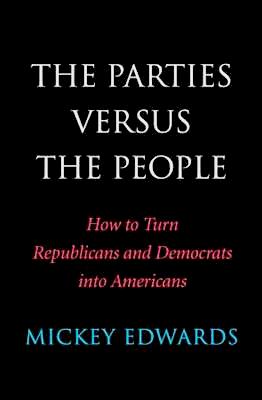After serving 16 years as a Republican Congressman from Oklahoma, Mickey Edwards saw, firsthand, how the political system became dysfunctional.

In a book that I believe should be required reading for anyone who wants a clear explanation, as well as solutions, to the gridlock facing Washington, Edwards latest book, The Parties versus The People – How to Turn Republicans and Democratsinto Americans makes clear that there is far too much power in the hands of both parties and a virtual lack of demonstrable caring about the people they purport to serve.
Quite simply, Edwards points out, they reward intransigence, discourage compromise and ultimately undermine our democracy.
Edwards begins with changes that have already taken hold.
“Three states,” Edwards writes, “most recently California in 2010, have noted to strip the parties of much of their power over the political system, an important and hopeful development.
“All across America, new organizations have emerged to promote bipartisanship or nonpartisanship. I have worked with several of them, most notably with No Labels (of which I am a cofounder), an organization of more than 400,000 fed-up citizens who do not seek the elimination of party labels but who insist on public leaders whose focus is no problem-solving without regard to those labels.”
The problem of party power has been with us since the early beginnings of the nation. “James Madison citied complaints ‘everywhere heard’ that ‘the public good is disregarded in the conflicts of rival parties, and that measures are too often decided, not according to the rules of justice and the rights of the minor party, but by the superior force of an interested and overbearing majority.’
“[Madison’s] description of the problem,” Edwards points out, “seems eerily familiar today, noting that ‘a zeal for different opinions [and] an attachment to different leaders ambitiously contending for pre-eminence and power’ had ‘divided mankind into parties, inflamed them with mutual animosity, and rendered them much more disposed to vex and oppress each other than to co-operate for their common good.’
The Washington Post studied voting records over a two-year period, “…forty-four of the one hundred members of the Senate had voted with their party more than 90 percent of the time, and that twenty-four of them – a fourth of the Senate – had gone along with party policy more than 95 percent of the time.”
The system of a representative government, Edwards warns, “is disappearing, as presidents and legislators who share the same party label increasingly see themselves as allies, not as independent actors, and party solidarity trumps both analysis and representation. Political parties are not inherently bad,” Edwards says, “citizens of common disposition will naturally seek each other out and combine to achieve agreed-upon ends – but when the pursuit of party power becomes the end goal and not merely a tool for achieving a better society, it is democracy itself that is laid beneath the guillotine’s blade.”
After his time in Congress and, more importantly, his sixteen years away from Washington teaching at Harvard and Princeton, Edwards has had a chance to think with greater clarity.
“The political system does, in fact, work; it works very well; it does precisely what it is designed to do. What we have created is a process in which the incentives reward those who cater not to the polity as a whole but to small and zealous subgroups who demand a rigid adherence to very narrow objectives, who punish deviation (in other words, thinking for oneself), and who, as a reward for conformity, limit the opposition that one faces in a general election by restricting ballot access through the unseemly and indefensible power our states have surrendered to self-serving political clubs. The government we have is dysfunctional in regard to the proper functions of governance, but it is scarily functional in following the trajectory that our political system rewards.”
So, how can we attain meaningful change from a system too disconnected from the people they represent? Edwards writes that there is a way forward. Those steps to be revealed in the final part of this series.
Comments











